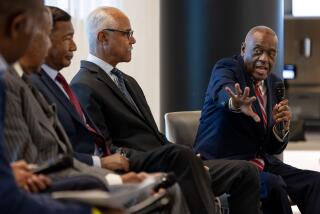TREND / BLACK ENTREPRENEURS : Business Owners Narrow Gap With Majority-Owned Firms
- Share via
WASHINGTON — At a time when news about the black community tends toward the negative, the Census Bureau has quietly noted a positive trend: Black entrepreneurs in the 1980s started companies at twice the national rate and maintained sales growth at virtually the same pace as their white counterparts.
The number of black-owned firms increased 38%--from 308,260 to 424,165--between 1982 and 1987, the most recent period for which information was available, according to the bureau’s statistics. By comparison, the total number of U.S businesses grew from 12 million to 13.7 million, or 14%, during the same period.
REVENUES DOUBLED: The bureau’s figures also revealed that black companies shared in the expansionary business climate of the 1980s, generating a 105% increase in revenues from $9.6 billion in 1982 to $19.8 billion in 1987, nearly matching all U.S. firms’ 106% sales gain from $967.5 billion to nearly $2 trillion.
Frank Fratoe, a research sociologist with the Minority Business Development Agency in the Commerce Department, says the survey’s “raw numbers indicate considerable growth among black-owned businesses. I’m personally impressed by the growth of black-owned businesses between 1982 and 1987.”
Fratoe says black-owned businesses “have a long way to go to catch up” with white-owned businesses, but the census data indicates black entrepreneurs are narrowing the gap between themselves and majority-run firms.
EQUAL PROPORTION: If the 1982-87 level of growth continues, “it wouldn’t be too long before black businesses are equal to their proportion in the population,” he added. “That’s nothing to shrug your shoulders at.”
While blacks make up about 13% of the nation’s population and are widely considered to spend roughly $260 billion per year, the census report indicates that black-owned firms were only 3% of all U.S. firms operating in 1987, generating a mere 1% of the nation’s business output.
Bart Landry, a University of Maryland sociologist who has studied the impact of entrepreneurship on the upward mobility of black Americans, says: “The start-up of small businesses among blacks has always lagged behind whites. So an acceleration of their starting new businesses at a faster rate than whites is significant.”
More than four of every five (83.3%) black-owned firms have no paid employees; only 189 of the firms had at least 100 workers. About half of all black-owned businesses are service firms, while 16% are retailers, the report states. As an income-producing group, automobile dealers and service stations led the list of top black-owned businesses with revenues of more than $2.1 billion, followed by business services, health services, specialty contractors and a variety of retail concerns.
“The fact that so many of them are service firms reflects the growth of the black middle class during the 1980s and the growth of people who want to service it,” said Ken Smikle, publisher of Target Market News, a Chicago-based trade publication that tracks black consumer patterns. “That means that blacks are doing business primarily with other black folks.”
URBAN FOCUS: Such an assessment is backed up by the geographic distribution of black-owned companies, with states in the Deep South and Northeast--where large numbers of blacks live--more likely to have greater numbers of black-owned firms. Most of the higher-revenue-producing firms are concentrated in the urban centers with high black populations. The nation’s 10 cities with the largest number of black-owned companies account for a disproportionate 35.8% of the nation’s black-owned firms and 36.5% of the sales.
Los Angeles trailed only New York as the city with the most black-owned companies and led the nation in sales for black-owned firms. The city’s 23,932 black-owned firms with sales of $1.3 billion accounted for 50% of California’s black-run companies and 55% of their revenues.
More to Read
Inside the business of entertainment
The Wide Shot brings you news, analysis and insights on everything from streaming wars to production — and what it all means for the future.
You may occasionally receive promotional content from the Los Angeles Times.










